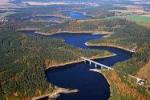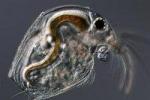Research activities of the Institute of Hydrobiology
Mission statement
The main aim of the Institute is research of biotic interrelations and their interaction with abiotic factors in lenitic water bodies, especially man-made reservoirs. An ecosystem-focused approach coupled with detailed investigations of selected processes involve multidisciplinary teamwork, relying on specialists in water chemistry, biochemistry, bacteriology, protozoology, algology, zooplanktonology and ichthyology. The participation of diverse specialists allows the study of trophic food chains with both principal approaches: bottom up and top down (feedback).
General information
A hydrobiological research unit was created in the Czechoslovak Academy of Sciences in the early fifties. In 1953, it became part of the Institute of Biology. It was incorporated into several institutes after reorganization of the Institute of Biology, with the exception of the period 1967-1970, when the Hydrobiological Laboratory was recognised as an independent entity. Later it became part of the Institute of Entomology and Institute of Landscape Ecology. In 1981, the Laboratory was moved to České Budějovice and in 1990 it became an autonomous institute.
The Institute pursues several long-term projects focused on biological processes in reservoirs. One of the most important research subjects is eutrophication. Biotic interactions in the plankton community has been a main focus, including the microbial loop, mechanisms of influencing water blooms, phosphorus load and lake turnover. Another research subject is atmospheric acidification of mountain lakes. Long-term studies have been carried out on the changes in the ionic composition and biodiversity in rivers, lakes and reservoirs caused by acid rain and fertilization. A characteristic feature of these studies is a combination of experimental and field approaches. Long-term ecological research on diverse Czech reservoirs has allowed distinguishing phenomena occurring at different time-scales. Elucidation of the fundamental environmental functions of reservoirs provides basic information for water quality management.
The present staff of about 60 people occupies 31 assigned positions (some fellows and PhD students have only part-time employment and are dependent on grant support). All scientists of the Institute take part in the teaching programmes or student tutoring.
Major research areas
Department of Plankton and Fish Ecology
This department performs research on the role biotic communities play in the food web of reservoirs or lakes, including relationships with physical, chemical and human influence. Specifically, the department addresses quantitative and qualitative occurrence of different organisms in terms of time cycles and occupied niches. An emphasis is placed on biotic interactions (feeding, growth, mortality, predation and production) that contribute to the ecological success of reservoir species. Both bottom-up (from nutrients to fish) and top-down (cascading from fish to phytoplankton) approaches are followed. The long-term development of zooplankton and fish during reservoir maturation is also studied. The department carries out extensive field surveys and a number of defined laboratory experiments. Significant effort is dedicated to unbiased quantitative surweying of fish in large inland waters. The staff members are responsible for the regular monitoring of the Slapy and Římov reservoirs.
Department of Aquatic Microbial Ecology
The members of the department primarily deal with carbon and nutrient flows through microbial food webs in systems of different trophic status. The principal questions investigated are related to elucidating the major processes affecting: (i) bacterial growth (nutrient and substrate availability) and mortality rates (protistan bacterivory and viral lysis), (ii) decomposing processes in natural aquatic ecosystems, and (iii) factors shaping microbial community composition from the level of bacteria and protozoa to algae, (iv) the specific role of phytoplankton, especially autotrophic picoplankton in food webs, (v) formation of cyanobacterial blooms, and (vi) taxonomical composition and functioning of cyanobacterial and algal assemblages. Specific attention is given to assessment of bacterial production and protozoan grazing, bacterial utilization of phytoplankton exudates, extracellular enzyme activities of bacteria and algae and the overall carbon and phosphorus flows through differently structured microbial food webs.
These ecological aspects and activities are studied in relationship to taxonomy, biology and ecology of the key microbial and algal species, or at least taxonomically well-defined microbial groups mediating these processes. To address these key questions, an approach combining experimental laboratory models (continuous and batch culture systems) and designed field studies is frequently applied.
Department of Hydrochemistry and Ecosystem Modelling
The department deals with complex aspects of water chemistry and element cycling in reservoir and lake ecosystems. The research is focused on (i) processes of eutrophication of aquatic ecosystem as a result of the interconnected effects of external and internal nutrient loading, together with the morphology and hydrodynamics of the water bodies; (ii) processes of acidification and recovery of mountain lakes and their catchments. Investigation of eutrophication and nutrient cycling in aquatic ecosystems has been accomplished mostly at reservoirs situated in the Vltava River basin. Long-term ecological monitoring is carried out at representatives of deep, stratified reservoirs (Slapy, Římov) and shallow reservoirs (Lipno, Jordán). Modelling approaches have been used in the identification of nutrient sources in catchment areas of reservoirs and in the studies of mixing processes in deep reservoirs.
Processes that control water composition in the entire catchment-lake ecosystem during acidification, recovery from acidification, and during changes of climate conditions , have been studied in the mountainous areas of the Czech and Slovak Republic, e.g. the Bohemian Forest and Tatra Mountains, respectively. The response of these ecosystems has been studied by experimental and modelling methods.
International conference "Fish Sampling with Active Methods"
















